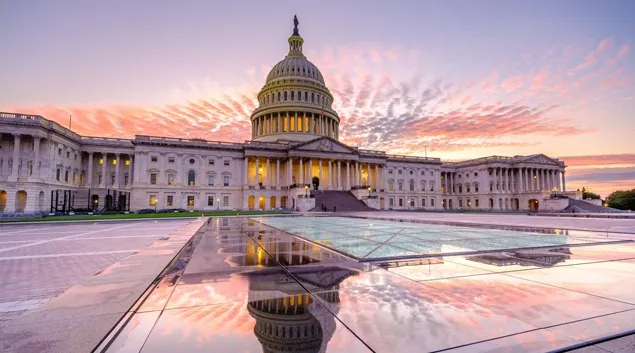
Photo: John Baggaley/Getty Images
The Senate on Sunday night voted 60-40 to advance a proposal to end the government shutdown by approving a continuing resolution to reopen the government.
According to The Hill, the proposal was facilitated by a group of centrist Democrats, who negotiated a funding deal with Senate Republicans and the White House.
The Senate was scheduled to reconvene this morning to continue working to end the shutdown, according to ABC News. Passage of the funding bill will require unanimous approval from all 100 senators, ABC reported.
After Senate approval, the bill then moves to the House.
The moves came days after a bipartisan group of lawmakers from the House of Representatives released a “statement of principals” that entails extending Affordable Care Act enhanced premium tax credits, one of the big healthcare-related topics stemming from the government shutdown, which has not lasted more than 40 days.
Advanced by Reps. Don Bacon (R-NE), Tom Suozzi (D-NY), Jeff Hurd (R-CO) and Josh Gottheimer (D-NJ), the principles focus on a temporary extension with what they called “reasonable income caps and reform.”
The expanded premium tax credit – introduced in the American Rescue Plan Act of 2021 and later extended through calendar year 2025 in the 2022 reconciliation act – is an advanceable and refundable credit that reduces enrollees' out-of-pocket costs for the premiums they pay for health insurance obtained through the marketplaces.
“Our hope is that this shared statement of principles will inspire bipartisan collaboration across Washington and help get Congress back to work for the American people,” the lawmakers wrote.
WHAT'S THE IMPACT
Bipartisan arguments over extending the enhanced premium tax credits that were put into place during the COVID-19 pandemic have been holding up passage of a spending bill.
Standard premium tax credits that were in place prior to the pandemic would remain even if lawmakers pass a bill that doesn’t include the enhanced premium tax credits.
House representatives are calling for a two-year extension of the Advanced Premium Tax Credits (APTC), with an income cap phased out between $200,000 and $400,000.
They also want guardrails to prevent improper payments of APTCs, such as requirements that ACA marketplaces confirm recipient eligibility with the Death Master File to prevent “ghost beneficiaries."
In an effort to crack down on fraud, the lawmakers said they want to establish a “preponderance of evidence” standard of proof to determine when an agent or broker should be allowed to continue operating in the ACA marketplaces.
They also call for requirements that marketplaces better notify recipients the value of APTCs they are receiving from the federal government.
“Democrats and Republicans can sit down, listen to one another, and find common ground, especially when it comes to lowering healthcare costs,” the lawmakers wrote. “We may not agree on every ideal outcome, but we’ve identified a fair, reasonable path forward on the future of the Affordable Care Act’s Enhanced Premium Tax Credits. Compromise isn’t rocket science and it shouldn’t be treated like a weakness.”
THE LARGER TREND
Permanently extending the Affordable Care Act's marketplace enhanced premium tax credits would have increased the federal deficit by an estimated $350 billion by 2035, but would also increase the number of Americans with health insurance by about 3.8 million, according to a September analysis from the Congressional Budget Office.
In addition to increasing both the deficit and the number of insured Americans, the CBO estimated that gross premiums for benchmark plans in the marketplaces would be 7.6% lower, on average, in each year from 2026 to 2035, compared with baseline projections. And premiums for the 2026 plan year would be 2.4% lower than baseline projections.
Separately, the Urban Institute released its own projections, estimating that 7.3 million fewer people will receive subsidized marketplace coverage in 2026 if the premium tax credits revert to their standard levels.
Eight states – Georgia, Louisiana, Mississippi, Oregon, South Carolina, Tennessee, Texas and West Virginia – would see their subsidized marketplace enrollment fall by more than half, that analysis projected.